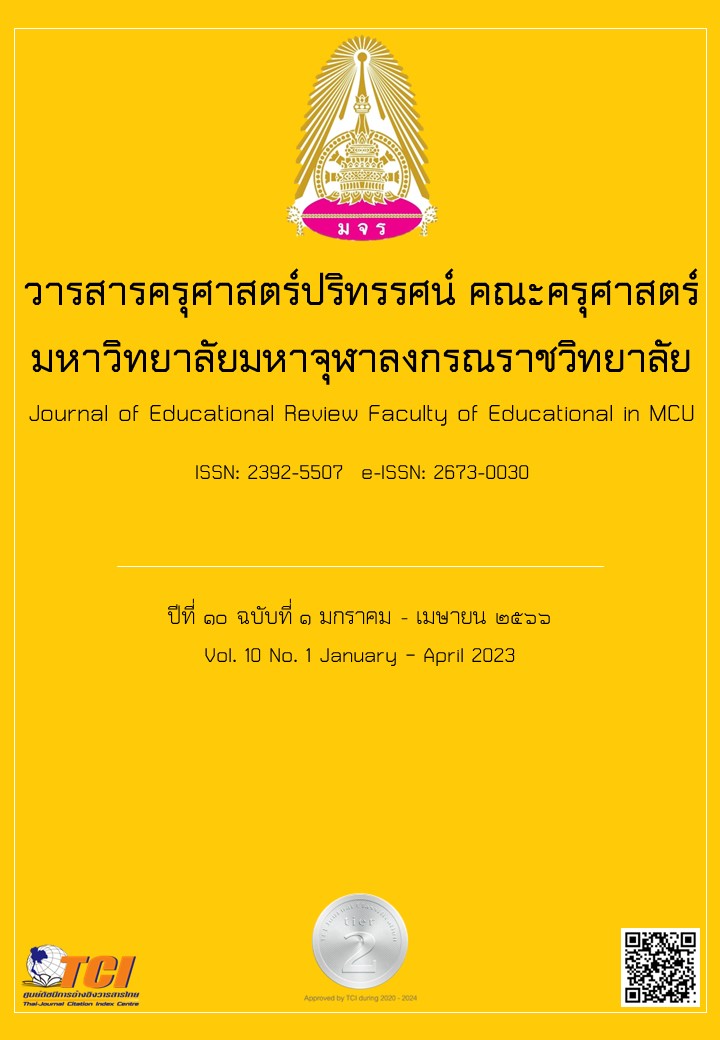THE PROMOTION OF MORALITY AND ETHICS ACCORDING TO THE TISIKKHA DHAMMA OF SECONDARY SCHOOLS, NA HAEO DISTRICT, LOEI PROVINCE
Main Article Content
Abstract
The objectives of this research were: 1) to study the condition for promoting basic morality and ethics among students in Na Haeo Wittaya School, Na Haeo District, Loei Province; 2) to study the promotion of basic morality and ethics according to the Tisikkha Dhamma (Threefold Training) principles of schools in Na Haeo District; 3) to propose guidelines for the promotion of basic morality and ethics according to the Tisikkha Dhamma of students in Na Haeo Wittaya School. This study was carried out by means of mixed-method research, both quantitative and qualitative methodologies. The questionnaire was used to collect the data from 181 samples, including teachers and students. The interview form was used to interview five experts to obtain the qualitative data. The quantitative data were interpreted by the following statistics: Mean and Standard Deviation, while the qualitative data were interpreted by content analysis. The research results were as follows: 1) The overall condition for promoting basic morality and ethics among students in Na Haeo Wittaya School, Na Haeo District, Loei Province, was statistically rated at a high level in all aspects. The highest mean value was seen in the aspect of honesty, followed by that of unity, politeness, cleanliness, kindness, discipline, diligence, and frugality, respectively. 2) The learning management and building habits for students were conducted by adopting the Tisikkha Dhamma integrated to promote eight basic morality and ethics in order to create learning by using Sila, Samadhi, and Pañña as the base of sustainable development. This encouraged students to learn and find themselves through the practice of the Dhamma. 3) The guidelines for the promotion of basic morality and ethics according to the Tisikkha Dhamma of students in Na Haeo Wittaya School were as follows: (1) organize activities or projects that promote morality and ethics; (2) before studying or starting any activity, students should be asked to practice meditation to prepare the body and the mind for increasing learning efficiency; (3) supervise the study, pay attention to activities and student behavior to guide and improve for the betterment; (4) organize activities or projects that promote meditation practice, problem-solving, speech contest or reading comprehension, etc.; (5) encourage students with Sammaditthi (Right View) to good morals, develop one's own intelligence (Pañña) and know how to see the world as it is.
Article Details

This work is licensed under a Creative Commons Attribution-NonCommercial-NoDerivatives 4.0 International License.
ทัศนะและความคิดเห็นที่ปรากฏในบทความในวารสารฉบับนี้ถือเป็นความรับผิดชอบของผู้เขียนบทความนั้นเพียงผู้เดียว และไม่ถือเป็นทัศนะและความรับผิดชอบของกองบรรณาธิการ
กองบรรณาธิการขอสงวนสิทธิ์ในการคัดเลือกบทความลงตีพิมพ์และจะแจ้งให้เจ้าของบทความทราบหลังจากผู้ประเมินบทความตรวจอ่านบทความแล้ว
ต้นฉบับที่ได้รับการตีพิมพ์ในวารสารครุศาสตร์ปริทรรศน์ คณะครุศาสตร์ มหาวิทยาลัยมหาจุฬาลงกรณราชวิทยาลัย ถือเป็นกรรมสิทธิ์ของคณะครุศาสตร์ มหาวิทยาลัยมหาจุฬาลงกรณราชวิทยาลัย ห้ามนำข้อความทั้งหมดหรือบางส่วนไปพิมพ์ซ้ำ เว้นเสียแต่ว่าจะได้รับอนุญาตจากมหาวิทยาลัยฯ เป็นลายลักษณ์อักษร
References
กระทรวงศึกษาธิการ. (2550). คุณธรรมพื้นฐาน 8 ประการ นโยบายเร่งรัดการปฏิรูปการศึกษา. กรุงเทพมหานคร: กระทรวงศึกษาธิการ.
กระทรวงศึกษาธิการ. (2551). ปฏิรูปการศึกษา 8 คุณธรรมพื้นฐาน. กรุงเทพมหานคร: กระทรวงศึกษาธิการ.
คณะกรรมการการประถมศึกษาแห่งชาติ. (2550). หลักเกณฑ์การประเมินคุณลักษณะของผู้บริหารโรงเรียนประถมศึกษา. กรุงเทพมหานคร: คณะกรรมการการประถมศึกษาแห่งชาติ.
พระครูประโชติจันทวิมล. (2556). การส่งเสริมคุณธรรมและจริยธรรม นักเรียนโรงเรียนนวมินทราชินูทิศ หอวัง นนทบุรี อำเภอปากเกร็ด จังหวัดนนทบุรี. วิทยานิพนธ์พุทธศาสตรมหาบัณฑิต. มหาวิทยาลัยมหาจุฬาลงกรณราชวิทยาลัย.
พระมหาอร่าม คุณชื่น และคณะ. (2549). แนวทางการพัฒนาส่งเสริมคุณธรรมและจริยธรรมของนักเรียนระดับมัธยมศึกษา สังกัดสำนักงานเขตพื้นที่การศึกษา กำแพงเพชรเขต 1. วิทยานิพนธ์การศึกษามหาบัณฑิต. มหาวิทยาลัยนเรศวร.
พระสุนธรณ์ ญาณสํวโณ (โสดามุข). (2558). สภาพคุณธรรมพื้นฐานนักเรียนมัธยมศึกษาโรงเรียนพยุห์วิทยา สังกัดสำนักงานเขตพื้นที่การศึกษามัธยมศึกษาเขต 28 (ศรีสะเกษ). วิทยานิพนธ์พุทธศาสตรมหาบัณฑิต. มหาวิทยาลัยมหาจุฬาลงกรณราชวิทยาลัย.
พีระพงษ์ สายเชื้อ. (2559). โครงการโรงเรียนคุณธรรม มุ่งพัฒนาคุณธรรมจริยธรรมให้เด็กพร้อมสร้างสังคมน่าอยู่. กรุงเทพมหานคร: โอเดี้ยนสโตร์.
มหาจุฬาลงกรณราชวิทยาลัย. (2539). พระไตรปิฎกภาษาไทย ฉบับมหาจุฬาลงกรณราชวิทยาลัย. กรุงเทพมหานคร: โรงพิมพ์มหาจุฬาลงกรณราชวิทยาลัย.
สำนักงานสภาพัฒนาการเศรษฐกิจและสังคมแห่งชาติ. (2564). แผนพัฒนาเศรษฐกิจและสังคมแห่งชาติฉบับที่สิบสอง พ.ศ.2560 – 2564. แหล่งที่มา https://www.nesdc.go.th/ewt_dl_link.php?nid=6422 สืบค้นเมื่อ 30 พ.ค. 2564.
สำนักพิมพ์หกเหลี่ยม. (2562). ทฤษฎีจิตวิเคราะห์ของซิกมัน์ฟอรยด์ บิดาแห่งจิตวิเคราะห์. แหล่งที่มา https://www.sixfacetspress.net/content/4849/ทฤษฎีจิตวิเคราะห์ของซิกมันด์-ฟรอยด์-บิดาแห่งจิตวิเคราะห์ สืบค้นเมื่อ 30 พ.ค. 2564.
Cronbach, Lee J. (1971). Essentials of psychological testing. 4th ed. New York: Harepr & Row.


